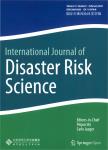Remittances for Disaster Risk Management: Perspectives from Pacific Island Migrants Living in New Zealand
Remittances for Disaster Risk Management: Perspectives from Pacific Island Migrants Living in New Zealand作者机构:Public Health and Psychosocial Studies Faculty of Health and Environmental Sciences Auckland University of Technology Emergency and Disaster Management Faculty of Health and Environmental Sciences Auckland University of Technology
出 版 物:《International Journal of Disaster Risk Science》 (国际灾害风险科学学报(英文版))
年 卷 期:2018年第9卷第3期
页 面:331-343页
核心收录:
学科分类:083002[工学-环境工程] 02[经济学] 0202[经济学-应用经济学] 0830[工学-环境科学与工程(可授工学、理学、农学学位)] 08[工学] 020202[经济学-区域经济学]
基 金:the Auckland University of Technology for providing funding to support this research
主 题:Disaster risk management Migration New Zealand Pacific Island countries Remittances
摘 要:In many low-income countries, migrant remittances are essential in sustaining people s livelihoods and become even more important during and after ***, policymakers, and practitioners increasingly emphasize the need to better support this people-based mechanism, so disaster risk can be reduced. This suggests the importance of understanding migrants perspectives on the remittance channels used and the challenges and opportunities of supporting remittances. However, such information is largely missing. Drawing on interviews and a focus group discussion carried out with Pacific Island migrants living in New Zealand, the article identifies the capacity of migrants to utilize different remittance channels and resources to assist those affected in their country of origin. Challenges faced include high transfer fees, lack of information and support from external stakeholders, and limited resources to effectively send both individual and collective remittances. The article concludes that there is a serious need to involve a large array of stakeholders in finding ways to better support remittances for disaster risk management, including migrants, government agencies, the private sector, nongovernmental organizations, and those receiving remittances.



